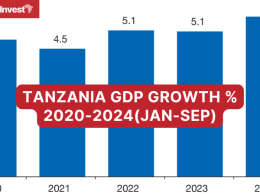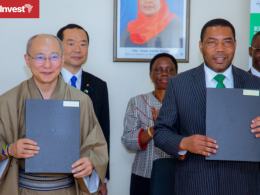On 18th September 2024, Tanzania’s Ministry of Agriculture officially presented market access dossiers for eight key crops to meet the phytosanitary entry standards of 14 international markets.
These dossiers are part of the Strengthening Plant Health Services in Tanzania for Enhanced Food Safety (STREPHIT) project to allow exports to the European Union (EU) and international markets in collaboration with the EU and the United Nations Food and Agriculture Organization (FAO).
The project is intended to boost exports of high-quality produce, increase foreign exchange earnings, and contribute to the overall growth of the agricultural sector.
The eight crops included in the dossiers are avocado, vanilla, black pepper, pineapple, cloves, cocoa, banana, and Irish potatoes which are expected to open economic opportunities worth USD 3.5 billion.
The 14 markets involved in this initiative are the 27 EU member states (Austria, Belgium, Bulgaria, Croatia, Republic of Cyprus, Czech Republic, Denmark, Estonia, Finland, France, Germany, Greece, Hungary, Ireland, Italy, Latvia, Lithuania, Luxembourg, Malta, Netherlands, Poland, Portugal, Romania, Slovakia, Slovenia, Spain, and Sweden), the USA, Zambia, Pakistan, South Africa, India, Brazil, Mexico, Singapore, China, Malaysia, Canada, Turkey, Iraq, and Israel.
Speaking at the launch in Dodoma, Tanzania’s Minister of Agriculture, Hon. Hussein Bashe highlighted: “This handover marks a crucial turning point for Tanzania’s agricultural sector. By complying with the market requirements of these 14 markets, we are creating opportunities for our farmers, especially those cultivating priority crops, to access broader trade markets, enhance their livelihoods, and strengthen Tanzania’s position in the international market.”
On his part, the Head of the Natural Resources Section of the EU in Tanzania and the East African Community, Lamine Diallo noted: “The development of these market dossiers highlights the commitment of the EU in supporting the agricultural sector in Tanzania, by improving safety and health standards for boosting access to export markets of Tanzania agricultural produce. These market dossiers will improve the investment promotion of the selected crops and products, stimulate growth in export business, and ultimately will benefit Tanzanian agriculture and farmers.”
On his part, FAO’s Country Representative Dr. Nyabenyi Tipo emphasized: “These achievements have been made possible through our joint efforts under the STREPHIT project. This initiative, led by FAO with the contribution agreement from the EU, focuses on strengthening Tanzania’s plant health services, ensuring that the country’s agricultural products meet the stringent phytosanitary standards required for global markets.”
For Zanzibar, Hon. Shamata Shaame Khamis, Minister of Agriculture of the archipelago, explained: “Cloves are one of our main export crops, alongside seaweed, spices, and fruits. Securing access to this substantial share of the global market will certainly benefit our farmers and strengthen our thriving agricultural sector which contributes about 85% of export earnings in Zanzibar and 27% of the GDP.”
The STREPHIT Project
STREPHIT is a four-year project launched in 2022 to ensure that Tanzania’s agricultural produce (from mainland Tanzania and Zanzibar) complies with the necessary phytosanitary standards and protocols for EU and international markets.
The project has a total budget of EUR 10.6 million, with the EU contributing EUR 10 million, FAO providing EUR 350,000, and the Government of Tanzania contributing EUR 250,000.
Key activities include training plant health inspectors at export and import posts, upgrading facilities like minilabs and incinerators, and establishing detection and traceability systems through harmonized HS codes in the Tanzania National Crop Information System (TANCIS) and Agricultural Trade Management Information System (ATMIS).
STREPHIT has already established four accredited laboratories, rehabilitated 19 border-post minilabs, secured vehicles for surveillance, and developed innovative data collection practices to support compliance with international standards.
In Zanzibar, enhancements have been made to plant health labs, alongside an upgraded Laboratory Information Management System. It also equips field plant protection and surveillance providers with the necessary skills and tools while raising awareness of services offered by the Plant Health and Biosafety Intelligence Unit at the Tanzania Plant Health and Pesticide Authority (TPHPA).
Tanzania produces an average of 190,000 tons of avocado fruits per year. It is the third major producer in Africa after South Africa and Kenya and the 19th country in the world.
Tanzania’s avocado exports increased from 17,711.49 tons, valued at USD 51 million in 2021/2022, to 26,826.30 tons, valued at USD 77.3 million in 2022/2023.
About 85% of avocados in the country are exported to European countries like France, Netherlands, and the United Kingdom; and the remaining to Kenya, Zambia, South Africa, China, Japan, Hong Kong, Saudi Arabia, and Qatar.
As of April 2024, a total of 11,499.4 tons of cocoa, valued at TZS 129 billion, have been collected and sold, compared to 8,868.51 tons worth TZS 37 billion in the 2022/2023 season.
In Zanzibar, cloves production has decreased from 7,840.8 tons in 2021 to 4,734.1 tons in 2022, representing a 40% decline due to a low production season.
A total of 1,673.0 tons, valued at TZS 29,940.6 million of cloves have been exported in the fourth quarter of 2023, showing a decrease in value of 46.2% compared to the corresponding quarter of 2022 and an increase of more than 100% compared with the third quarter of 2023.










